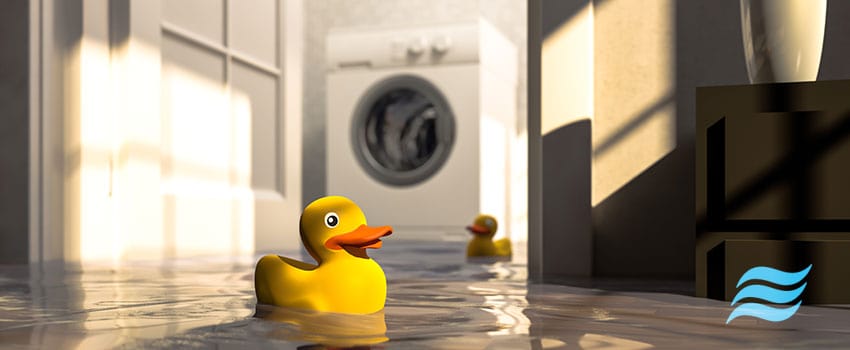
How To Protect Your Home From Flooding
Protecting your home from flooding probably isn't at the top of your to-do list – but it's an essential part of being a homeowner.
Despite what you might think, most flood damage to properties is actually caused by plumbing failures and faulty appliances (not natural disasters!). Luckily, this type of flooding is completely preventable with regular plumbing maintenance.
If you're unlucky enough to own property in a flooding hotspot, you'll need to take a more proactive approach to prepare your property for the next downpour.
The 4 steps to protect your home from flooding
- Figure out if your geographical area is at risk of flooding
- Install one (or more) sump pumps in your basement/crawl space
- Purchase an insurance policy that covers flooding
- Make sure your pipes are ready for winter
1. Figure out if your geographical area is at risk of flooding
The first thing to do is to figure out if your home is located in a flood plain? If you're in Northern Virginia, you most likely are at risk of flood. As great as our state is, we do suffer from bad weather in the winter!
If you're not sure about if your property's under the threat of flooding, the Federal Emergency Management Agency(FEMA) website can help. There are easy-to-read illustrations to show each area of the US and its risk of flooding. They even map out areas affected by rising sea levels.
The other factor besides being in a flood zone is the placement and design of your home. Is your house in the direct path of natural runoff – are you at the base of a hill? Is there a man-made structure that redirects the natural flow of water towards your home? Do you have low spots in your yard that cause water to pool towards your home?
If you're new to an area, try talking to your neighbors – they can let you know if there have ever been problems with flooding in the area or at your home before. Never underestimate the history neighbors can provide.
2. Install one (or more) sump pumps in your basement/crawl space
If your home has a basement or low crawl space, you might find water builds up during heavy rain. The solution is to install a sump pump. Sump pumps help to remove built up water from your property.
How do sump pumps work? If groundwater seeps into your basement, it'll flow to the lowest point, where it collects in a pit. The water in the pit is then pumped out to a better water flow area outside the property and away from your house.
To avoid flood damage, you need to be proactive and have your sump system installed, inspected and ready for use.
3. Purchase an insurance policy that covers flooding
Most homeowner's insurance policies do not cover flood damage. Check your policy's fine print and if you don't have flood insurance, consider investing in it sooner rather than later.
Insurance for flood damage is relatively inexpensive and you can't put a price on the piece of mind it provides.
4. Make sure your pipes are ready for winter
OK, we've covered flooding due to bad weather – but what about flooding caused by burst pipes? Burst pipes are a very real threat when a property's left empty or left unprepared during a vacation. If you're planning on leaving your property for more than a night or two, there a number of things you can do to avoid a burst pipe.
- Insulate pipes with insulation sleeves or slip-on foam pipe insulation. (Don't leave any gaps – cold air can affect the pipe)
- Check your home's exterior and seal off any visible cracks with caulking or spray foam
Leave your heating on at a steady temperature (around 55 degrees) to protect pipes against the cold - Leave a faucet dripping – when water moves freely it's less likely to freeze
Insulate your crawl space properly - Block all vents that lead to the outside using cardboard or wood
- Drain your hose bibs and insulate with covers. Once this has been completed, deactivate bibs at the shutoff valve.
- Use heat tape to protect pipes from freezing. Heat tape is one of the most popular methods for winterizing plumbing, but be aware that these might bring additional hazards. The U.S. CPSC has provided safety recommendations for homeowners using heat tapes to help prevent fires.
If you’re concerned about your home flooding, take action now and have your plumbing looked at before it causes major damage to your home.
